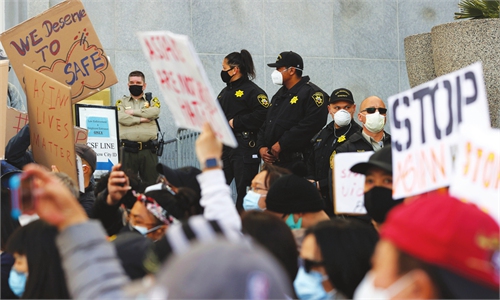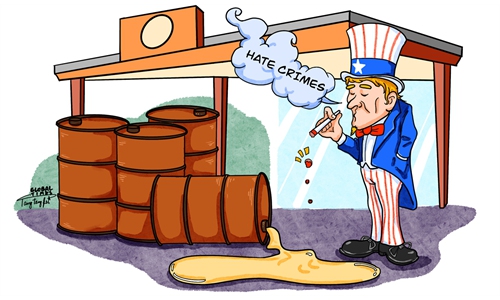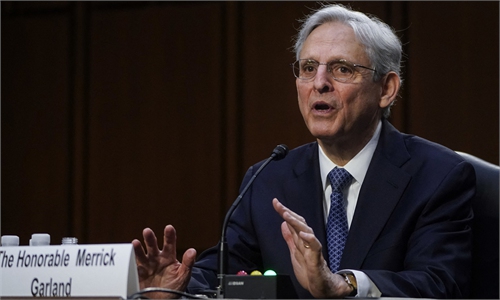Debunk model minority myth
Asian Americans paving their way through a transformative year
Against the backdrop of hate crimes, especially the spa shootings in mid-March in Atlanta, which killed at least eight people, some Asian Americans shared their frustrations and concerns with the Global Times. Two New Yorkers think it high time to debunk the model minority myth. Both believe that it is vital to have their voices heard, which could be the hope for their next generations in the "melting pot" of the US.
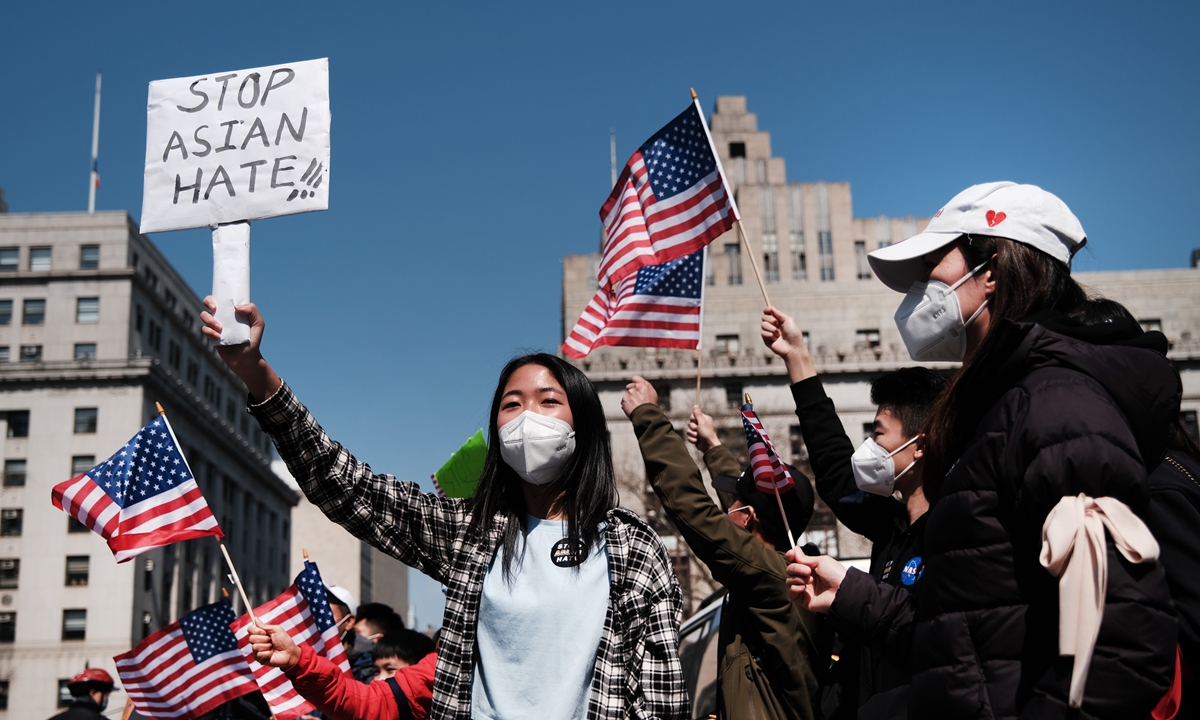
Now she looks back with one question in mind. "But, where has this gotten us? We're depicted as pushovers and easy targets. We're conveniently called the model minority when it works to the advantage of the media, but now with the pandemic, we're all being treated like a virus, as if we are the reason for the pandemic," she said in an email reply to the Global Times.
'Mad, angry and fed up'
McSween said that the COVID-19 pandemic "spread like wildfire everywhere else because no one was taking the precautions seriously."
"I remember shopping in a grocery store in early March, where a man coughed and sneezed in people's faces and then laughed as they turned away from him. I wish I could have said something, but I'm not used to confrontation," she said, recalling days before the fatal spa shootings.
However, with incidents against races such as the Black and Asian Americans, she noted her attitudes have changed.
"But, now I'm mad, angry and fed up. I'm so proud of the many the Asian American and Pacific Islander [AAPI] organizations standing up to unify our community. Together we're stronger. My husband, sons and I participated in the March 21 rally against anti-Asian violence in NYC's Chinatown. It was so powerful being there with 10,000 people who were supporting and fighting for our community. We have to keep the momentum of this movement. It's the only way things will change," she stressed.
'Transformative'
Jose Abellar, originally from the Philippines, is a NYC-based fashion designer and father of three, recalled his own experience.
"I moved to NYC in my 20s and was lucky to find myself working among many Asian Americans. People in my field tend to hire us because of our work ethic. We were the model minority because we didn't complain much for working too many hours and we were dedicated," he said.
Abellar described the past year as "exhausting, heartbreaking and transformative."
He "just started a new job in August and have been working remotely while homeschooling" his 7-year old twins, he said in an email reply to the Global Times on Saturday.
He "lost a few loved ones this past year, one to COVID[-19]," he said, adding "This year forced me to take stock of my life and truly appreciate what I have and to reevaluate my priorities."
Abellar has lived in San Francisco, California, and New York at different times in his life.
He moved to San Francisco from the Philippines at an early age, when he felt "AAPI were tolerated but ignored. I just thought that kids were cliquey, but realized this behavior is more common than not. Early adulthood in San Francisco was the same. Luckily, I worked in fashion, so I felt integrated into an industry where race didn't seem like it was an issue," he said.
He believes that "in hindsight, New York definitely felt more welcoming and diverse."
Fear in train stations
Abellar shared the latest hate crime he had witnessed.
"I was on a subway train and saw someone on the platform casually pull his mask down long enough to spit at an Asian guy," he said.
In the given status quo, Abellar thinks that all Asian Americans need to speak out.
"We will not get our voices taken away. Asian Americans have been silent for too long and it's time everyone knows just how we feel - we deserve equality, happiness and opportunities just like everyone else," he noted.
As a mother, McSween shared her concerns for her sons.
"I absolutely worry about my sons returning to school. Their schools have been closed for the past year due to the pandemic, but one just opened for blended learning. My oldest son will be going to school one day per week. I worry about him taking the train. I worry about him walking from the train to school. We've had numerous conversations about what to do, but honestly, I don't know what to tell him. He's 16," she said.
Talking about staying safe, Abellar said "I just started self-defense classes last week."
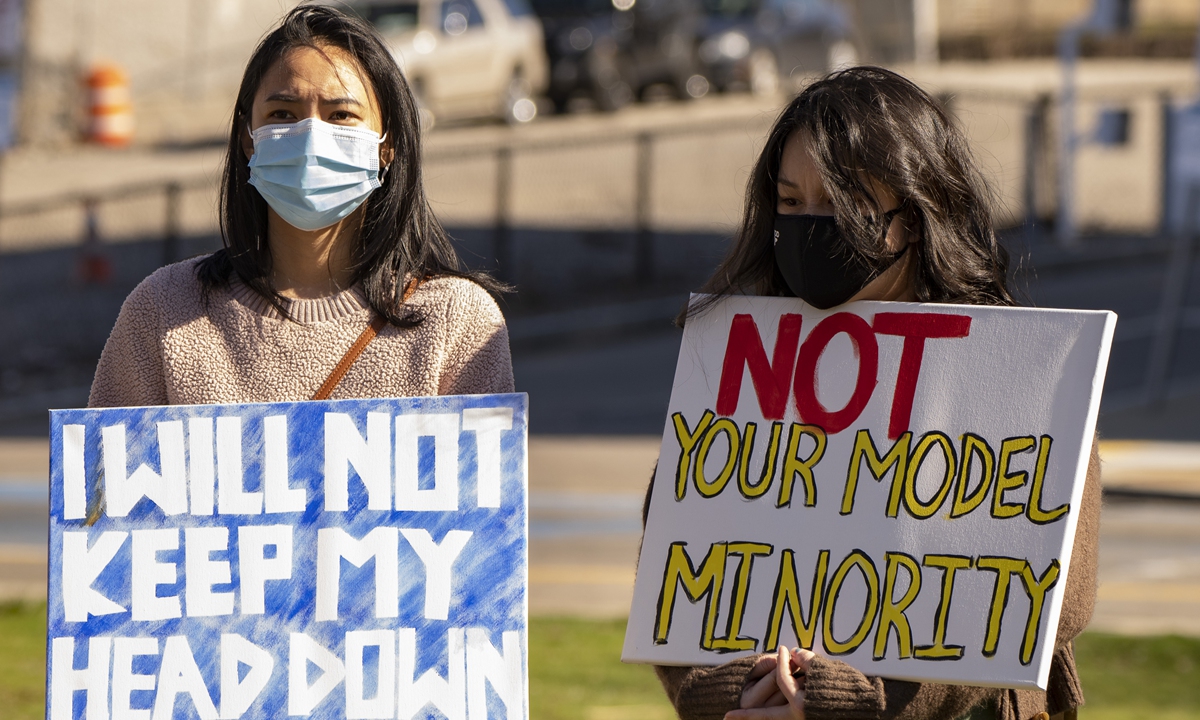
Both McSween and Abellar said that they hope the next generations will be fair in providing equal opportunities for their children.
Looking back, Abellar said "I never really embraced my Asian identity growing up. I was rarely accepting of my own upbringing, ethnicity, culture and history. When it came down to it, being Asian never felt good enough. After being teased and feeling ashamed for who I was and where my family came from, I decided it was easier to assimilate."
Through the years, "I've learned to embrace my Asianness, and have become a proud Filipino American. This is years after struggling to fit in and be 'American.' I've since learned to have the best of both worlds," he said.
"I'm a father of three wonderful children. I wish that my kids never have the same conflicts as me. I pray that the color of their skin or shape of their eyes never keeps them from realizing their full potential or are treated poorly," he added.
As the awareness grows and the AAPI community continues to stand together in condemning these acts of violence, McSween hopes that "organizations and businesses, including the educational system, will be fair in providing equal opportunities for our children. I equate it to the Black Lives Movement, which has forever been a part of our nation's history. If people didn't stand up, rally, or speak up, programs wouldn't be in place to support the black community. Again, this is my hope."
"We are in the middle of fighting to debunk the model minority myth and that 'We are not a virus.' As long as we stand together in solidarity and keep pushing to have our voices heard, we can change the future… and we have to because our lives depend on it," she said.
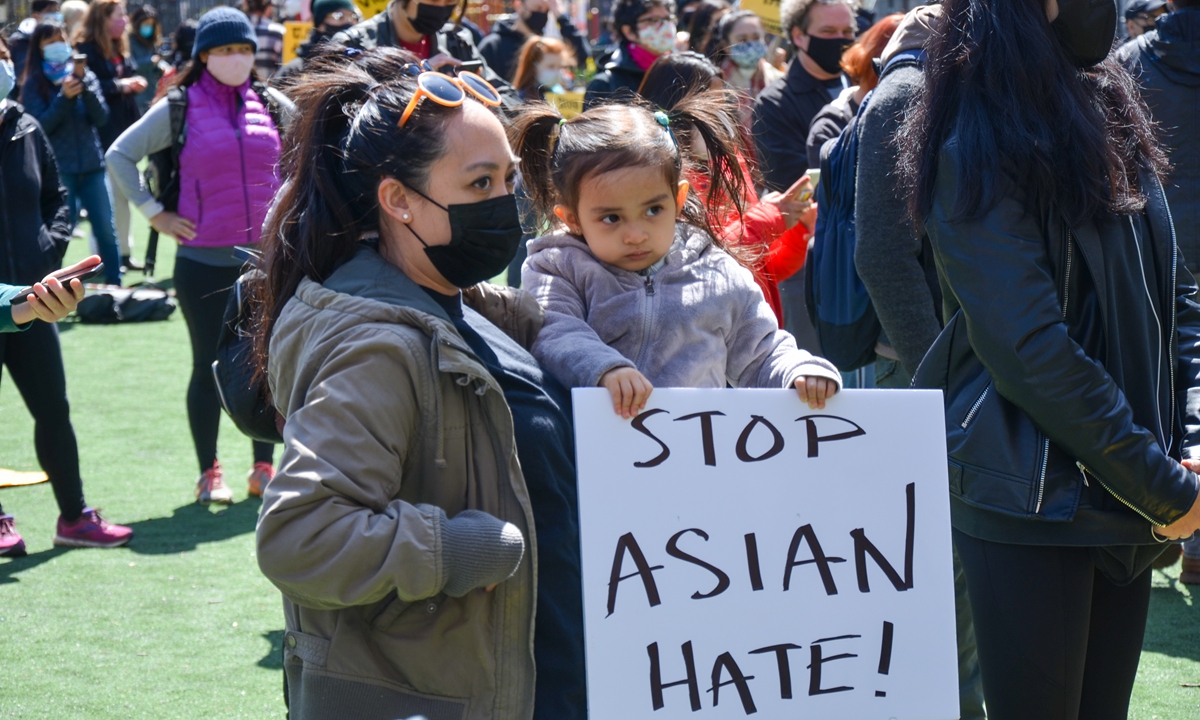
On March 30, US Attorney Merrick General Garland launched an internal review to track racially motivated hate crimes.
Abellar said the move is "helpful. The more data to support our cry for help, the better."
On the same day, the US National Council of Asian Pacific Americans announced that the Biden Administration has committed to taking action in supporting the AAPI community.
"These measures are absolutely helpful and give me hope that things will slowly change. Unfortunately, there is still a lot of misplaced anger and resentment over people's loss of jobs, losing loved ones, and being pent up for the past year, but the awareness and national attention of these anti-Asian hate crimes will hopefully make people realize that they can't and won't get away with these unprovoked attacks on our elders, women, men, and children," McSween said.

People participate in a protest to demand an end to anti-Asian violence on Sunday in New York City. The group, which numbered near 3000 and was made up of activists, residents and local politicians, marched across the Brooklyn Bridge. After a rise in hate crimes against Asians across the US and in New York City, groups are speaking up and demanding more attention to the issue. Photo: VCG
"Most Asian Americans have been taught to work hard, keep your head down, don't draw attention to yourself, show respect to others, and treat others the way you want to be treated. I've been taught these things and I'm teaching my kids the same," Michele Wong McSween, a mother of three, author and fourth-generation Chinese American, told the Global Times on Friday. She resides in Brooklyn, New York City (NYC).Now she looks back with one question in mind. "But, where has this gotten us? We're depicted as pushovers and easy targets. We're conveniently called the model minority when it works to the advantage of the media, but now with the pandemic, we're all being treated like a virus, as if we are the reason for the pandemic," she said in an email reply to the Global Times.
'Mad, angry and fed up'
McSween said that the COVID-19 pandemic "spread like wildfire everywhere else because no one was taking the precautions seriously."
"I remember shopping in a grocery store in early March, where a man coughed and sneezed in people's faces and then laughed as they turned away from him. I wish I could have said something, but I'm not used to confrontation," she said, recalling days before the fatal spa shootings.
However, with incidents against races such as the Black and Asian Americans, she noted her attitudes have changed.
"But, now I'm mad, angry and fed up. I'm so proud of the many the Asian American and Pacific Islander [AAPI] organizations standing up to unify our community. Together we're stronger. My husband, sons and I participated in the March 21 rally against anti-Asian violence in NYC's Chinatown. It was so powerful being there with 10,000 people who were supporting and fighting for our community. We have to keep the momentum of this movement. It's the only way things will change," she stressed.
'Transformative'
Jose Abellar, originally from the Philippines, is a NYC-based fashion designer and father of three, recalled his own experience.
"I moved to NYC in my 20s and was lucky to find myself working among many Asian Americans. People in my field tend to hire us because of our work ethic. We were the model minority because we didn't complain much for working too many hours and we were dedicated," he said.
Abellar described the past year as "exhausting, heartbreaking and transformative."
He "just started a new job in August and have been working remotely while homeschooling" his 7-year old twins, he said in an email reply to the Global Times on Saturday.
He "lost a few loved ones this past year, one to COVID[-19]," he said, adding "This year forced me to take stock of my life and truly appreciate what I have and to reevaluate my priorities."
Abellar has lived in San Francisco, California, and New York at different times in his life.
He moved to San Francisco from the Philippines at an early age, when he felt "AAPI were tolerated but ignored. I just thought that kids were cliquey, but realized this behavior is more common than not. Early adulthood in San Francisco was the same. Luckily, I worked in fashion, so I felt integrated into an industry where race didn't seem like it was an issue," he said.
He believes that "in hindsight, New York definitely felt more welcoming and diverse."
Fear in train stations
Abellar shared the latest hate crime he had witnessed.
"I was on a subway train and saw someone on the platform casually pull his mask down long enough to spit at an Asian guy," he said.
In the given status quo, Abellar thinks that all Asian Americans need to speak out.
"We will not get our voices taken away. Asian Americans have been silent for too long and it's time everyone knows just how we feel - we deserve equality, happiness and opportunities just like everyone else," he noted.
As a mother, McSween shared her concerns for her sons.
"I absolutely worry about my sons returning to school. Their schools have been closed for the past year due to the pandemic, but one just opened for blended learning. My oldest son will be going to school one day per week. I worry about him taking the train. I worry about him walking from the train to school. We've had numerous conversations about what to do, but honestly, I don't know what to tell him. He's 16," she said.
Talking about staying safe, Abellar said "I just started self-defense classes last week."

A protester holds sign during Stop Asian Hate Rally at Nubian Square in Boston, the US, on March 27. Photo: VCG
Equal opportunitiesBoth McSween and Abellar said that they hope the next generations will be fair in providing equal opportunities for their children.
Looking back, Abellar said "I never really embraced my Asian identity growing up. I was rarely accepting of my own upbringing, ethnicity, culture and history. When it came down to it, being Asian never felt good enough. After being teased and feeling ashamed for who I was and where my family came from, I decided it was easier to assimilate."
Through the years, "I've learned to embrace my Asianness, and have become a proud Filipino American. This is years after struggling to fit in and be 'American.' I've since learned to have the best of both worlds," he said.
"I'm a father of three wonderful children. I wish that my kids never have the same conflicts as me. I pray that the color of their skin or shape of their eyes never keeps them from realizing their full potential or are treated poorly," he added.
As the awareness grows and the AAPI community continues to stand together in condemning these acts of violence, McSween hopes that "organizations and businesses, including the educational system, will be fair in providing equal opportunities for our children. I equate it to the Black Lives Movement, which has forever been a part of our nation's history. If people didn't stand up, rally, or speak up, programs wouldn't be in place to support the black community. Again, this is my hope."
"We are in the middle of fighting to debunk the model minority myth and that 'We are not a virus.' As long as we stand together in solidarity and keep pushing to have our voices heard, we can change the future… and we have to because our lives depend on it," she said.

A young participant is seen holding a placard at Columbus Park in Lower Manhattan during Stop Asian Hate demonstration to show support to Asian community in New York City. Photo: VCG
'Slowly change'On March 30, US Attorney Merrick General Garland launched an internal review to track racially motivated hate crimes.
Abellar said the move is "helpful. The more data to support our cry for help, the better."
On the same day, the US National Council of Asian Pacific Americans announced that the Biden Administration has committed to taking action in supporting the AAPI community.
"These measures are absolutely helpful and give me hope that things will slowly change. Unfortunately, there is still a lot of misplaced anger and resentment over people's loss of jobs, losing loved ones, and being pent up for the past year, but the awareness and national attention of these anti-Asian hate crimes will hopefully make people realize that they can't and won't get away with these unprovoked attacks on our elders, women, men, and children," McSween said.
